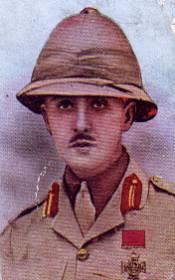Percy Hansen facts for kids
Quick facts for kids
Percy Hansen
|
|
|---|---|
 |
|
| Born | 26 October 1890 Durban, South Africa |
| Died | 12 February 1951 (aged 60) Copenhagen, Denmark |
| Buried |
Garrison Cemetery, Copenhagen
|
| Allegiance | United Kingdom |
| Service/ |
British Army |
| Years of service | 1911–1946 |
| Rank | Brigadier |
| Service number | 6724 |
| Unit | Lincolnshire Regiment |
| Commands held | 2nd Battalion, Lincolnshire Regiment |
| Battles/wars | First World War Arab revolt in Palestine Second World War |
| Awards | Victoria Cross Distinguished Service Order Military Cross Mentioned in Despatches (5) Croix de guerre (France) Commander of the Royal Order of St. Olav (Norway) Officer of the Legion of Merit (United States) |
Brigadier Percy Howard Hansen, VC, DSO, MC (26 October 1890 – 12 February 1951) was a brave British Army officer. He received the Victoria Cross (VC). This is the highest award for courage in the British and Commonwealth forces. It is given for amazing bravery when facing the enemy.
Contents
Early Life of Percy Hansen
Percy Hansen was born on October 26, 1890. His family was Danish and quite wealthy. They first lived in South Africa. After 1900, they moved to London. Percy went to special schools called preparatory schools. These were in Hazelwood and Oxted, Surrey. Later, he attended the famous Eton College from 1904. His father became a British citizen in 1910. This allowed Percy to join the British Army.
Military Career Highlights
Percy Hansen trained to become an officer. He went to the Royal Military College, Sandhurst. On March 4, 1911, he officially joined the Lincolnshire Regiment.
Bravery in the First World War
When the First World War started in 1914, Percy became a temporary captain. He worked as an adjutant for the 6th Battalion of the Lincolnshire Regiment. This promotion became permanent in April 1915.
He fought with his battalion in the Gallipoli campaign in the summer of 1915. His battalion was made of civilian volunteers. These soldiers were part of Kitchener's Army.
Saving Lives at Gallipoli
On August 9, 1915, at Yilghin Bumu, Hansen's battalion had to retreat. They were attacking Scimitar Hill. Some wounded soldiers were left behind. The dry bushes had caught fire, making it very dangerous. Captain Hansen and a few volunteers bravely ran back and forth. They went under heavy enemy fire. They successfully rescued six wounded men. These men would have been captured or burned to death. For this incredible bravery, Hansen received the Victoria Cross.
Daring Reconnaissance Missions
A month later, Hansen earned the Military Cross. He went on a dangerous scouting mission at Suvla Bay. On the night of September 9, 1915, he explored the coast alone. He only carried a revolver and a blanket for disguise. He found an important Turkish firing position.
Later, due to illness, Hansen moved to France. He became a brigade major for the 170th (2/1st North Lancashire) Brigade. He worked as a staff officer for the rest of the war. He served with the II Anzac Corps. He also received the Distinguished Service Order (DSO). This was for another brave scouting mission during the Battle of Passchendaele in 1917.
Between the World Wars
Percy Hansen stayed in the army after the First World War. He attended the Staff College, Camberley. For most of the time between the wars, he held many staff jobs. He served in different infantry brigades. He also worked as a General Staff Officer in Jamaica.
Later, he joined the 2nd Battalion, Lincolnshire Regiment. He was the second-in-command. His battalion was in Palestine. There was an Arab revolt happening there. In September 1937, Hansen became the Commanding Officer (CO) of the battalion. He led them until the Second World War began in September 1939.
Role in the Second World War
On September 2, 1939, just before the war started, Hansen was moved. He joined the 55th (West Lancashire) Infantry Division. He became the Assistant Adjutant-General & Quartermaster-General. He held this job until January 1941.
Then, he became Deputy Assistant & Quartermaster-General for XII Corps. This corps was led by Lieutenant General Bernard Montgomery. Their job was to defend Kent from a possible German invasion of the United Kingdom.
Hansen continued in this role until February 1942. He then became an Area Commander in Belfast. After that, he was a Sub-District Commander in Ashford. Finally, he worked on the staff of Supreme Headquarters Allied Expeditionary Force (SHAEF). He stayed there until the war ended in 1945. He retired from the army in January 1946.
Percy Hansen passed away on February 12, 1951. He was 60 years old. He is one of only a few people not born as a British subject to receive the Victoria Cross.
Awards and Decorations
Percy Hansen received many important awards for his bravery and service:
- Victoria Cross (October 1, 1915)
- This was for rescuing six wounded men from burning to death under heavy fire at Gallipoli.
- Distinguished Service Order (September 16, 1918)
- Awarded for bravely gathering important information under heavy enemy fire.
- Military Cross (October 29, 1915)
- Given for his solo reconnaissance mission at Suvla Bay, where he found a Turkish gun position.
- Mentioned in dispatches five times
- Croix de Guerre with Bronze Star (France)
- Officer of the Legion of Merit (United States)
- Commander of the Royal Order of St Olav (Norway)
 | Precious Adams |
 | Lauren Anderson |
 | Janet Collins |

